|
Word Gems
exploring self-realization, sacred personhood, and full humanity
Editor's Essay
Causation and Induction
return to "Causation" main-page

|
Chicken or Egg? – which came first? This riddle of causation, referred to as “tangled hierarchies,” is addressed within the sphere of biological evolution. See the research report.
|
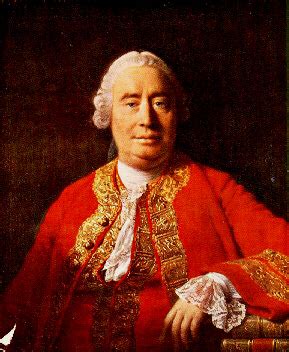
David Hume, 1711 - 1776
Why should we read David Hume’s writings of almost 300 years ago? – especially, on seemingly esoteric topics such as causation and induction.
Hume’s writings remain relevant and even vital to successful living as they discuss the problem of knowledge.
For thousands of years, fear-based groups - political parties, churches, fake-science camps - have promoted belief systems as self-serving definitions of truth, law, or doctrine. How shall we evaluate these spurious claims to knowledge, that is, dogma and credalism posing as knowledge?
Today, however, the stakes are so much higher with the world's super-rich attempting a global totalitarian power-grab via Orwellian censorship, a mass-media manipulation augmented by instantaneous worldwide communications.
We gasp to observe just how far we've drifted from the Declaration's personal-liberty ideals, as almost all news now, "fake news," represents some form of unsubstantiated claim to knowledge: knowledge as mere assertion, bold prevarication made legitimate by constant repetition; knowledge as "how can we fool'em today"; knowledge as "reality control" and propaganda; knowledge as "there is no evidence" and "don't look behind that curtain"; knowledge as smearing enemies, the ready accusation of "conspiracy kook" for those who challenge the conspiratorial narrative; knowledge as coercion and intimidation.

No democratic society can long endure thus constituted. It's only a minute or two before midnight now; we stand at a crossroads of the survival of personal-liberty traditions of Western civilization.
However, Hume's essays on causation and induction, for those still retaining critical judgment faculties, offer insight regarding the nature of the puritanical witch-hunts; moreover, and most importantly, help to maintain one's own humanity.
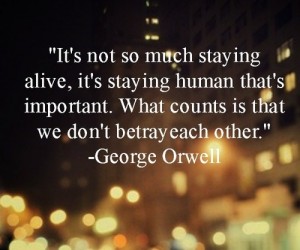
Editor’s note: The realization of what is happening in the world is more than disconcerting and can produce considerable anxiety. It’s 1932 again with international totalitarianism, brash and cocky and in-your-face, seemingly with the upper hand and on the march. However, Orwell is right. While it’s true that, before this is over, we should not be surprised to witness “blood in the streets,” the preservation of our mortal lives is not the biggest issue before us. We always retain the trump card of Summerland only one heartbeat away; we cannot be robbed of our true selves and our treasured destiny. As such, the real concern for us is that of retaining one’s humanity in this rising tide of pandemic evil.
"dogmatic slumber"
The great Immanuel Kant admitted that Hume’s writings had awakened him from his “dogmatic slumber.” Many of us need to awaken, as well.
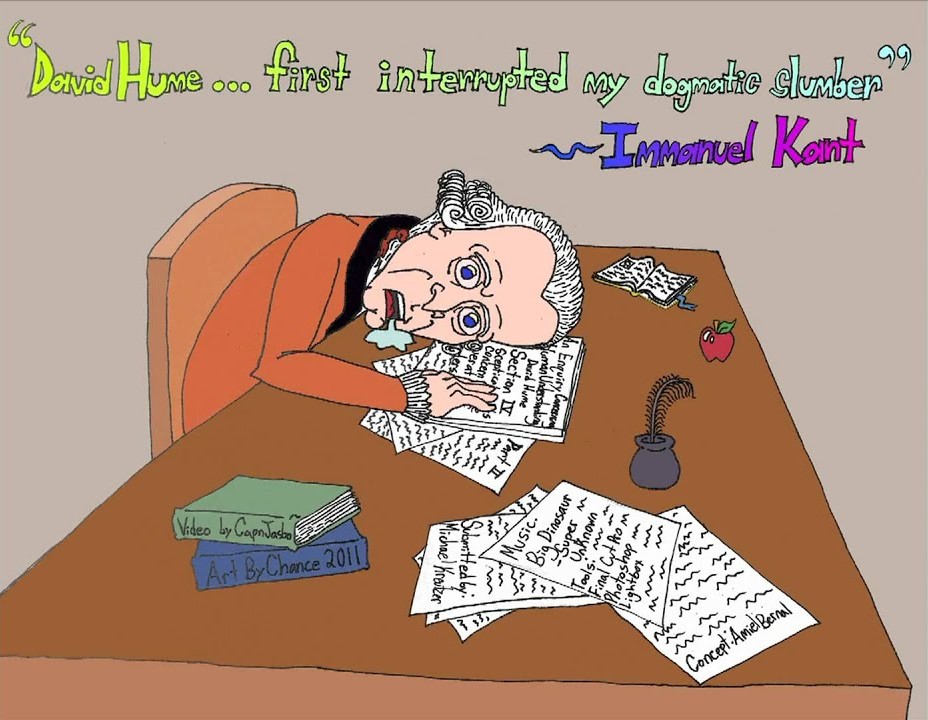
And university philosophy departments continue to rate Hume as “must read” in the area of causation and induction.
In the writing below, I will be referring, by line-item, to Hume's actual words, supplied here as prelude to the discussion.
|
excerpts, David Hume's A Treatise of Human Nature (1740)
8. It is evident that all reasonings concerning matter of fact are founded on the relation of cause and effect, and that we can never infer the existence of one object from another, unless they be connected together, either mediately or immediately. In order, therefore, to understand these reasonings, we must be perfectly acquainted with the idea of a cause; and in order to that, must look about us to find something that is the cause of another.
9. Here is a billiard-ball lying on the table, and another ball moving towards it with rapidity. They strike; and the ball which was formerly at rest now acquires a motion. This is as perfect an instance of the relation of cause and effect as any which we know, either by sensation or reflection. Let us therefore examine it. It is evident that the two balls touched one another before the motion was communicated, and that there was no interval betwixt the shock and the motion. Contiguity in time and place is therefore a requisite circumstance to the operation of all causes. It is evident, likewise, that the motion which was the cause is prior to the motion which was the effect. Priority in time is therefore another requisite circumstance in every cause. But this is not all. Let us try any other balls of the same kind in a like situation, and we shall always find that the impulse of the one produces motion in the other. Here, therefore, is a third circumstance, viz. that of a constant conjunction betwixt the cause and effect. Every object like the cause produces always some object like the effect. Beyond these three circumstances of contiguity, priority, and constant conjunction, I can discover nothing in this cause. The first ball is in motion; touches the second; immediately the second is in motion: and when I try the experiment with the same or like balls, in the same or like circumstances, I find that upon the motion and touch of the one ball, motion always follows in the other. In whatever shape I turn this matter, and however I examine it, I can find nothing farther.
10. This is the case when both the cause and effect are present to the senses. Let us now see upon what our inference is founded, when we conclude from the one that the other has existed or will exist. Suppose I see a ball moving in a straight line towards another, I immediately conclude that they will shock and that the second will be in motion. This is the inference from cause to effect, and of this nature are all our reasonings in the conduct of life: on this is founded all our belief in history; and from hence is derived all philosophy, excepting only geometry and arithmetic. If we can explain the inference from the shock of two balls, we shall be able to account for this operation of the mind in all instances.
11. Were a man, such as Adam, created in the full vigour of understanding, without experience, he would never be able to infer motion in the second ball from the motion and impulse of the first. It is not anything that reason sees in the cause which makes us infer the effect. Such an inference, were it possible, would amount to a demonstration, as being founded merely on the comparison of ideas. But no inference from cause to effect amounts to a demonstration, of which there is this evident proof. The mind can always conceive any effect to follow from any cause, and indeed any event to follow upon another: whatever we conceive is possible, at least in a metaphysical sense; but wherever a demonstration takes place, the contrary is impossible, and implies a contradiction. There is no demonstration, therefore, for any conjunction of cause and effect. And this is a principle which is generally allowed by philosophers.
12. It would have been necessary, therefore, for Adam (if he was not inspired) to have had experience of the effect which followed upon the impulse of these two balls. He must have seen, in several instances, that when the one ball struck upon the other, the second always acquired motion. If he had seen a sufficient number of instances of this kind, whenever he saw the one ball moving towards the other, he would always conclude without hesitation that the second would acquire motion. His understanding would anticipate his sight and form a conclusion suitable to his past experience.
13. It follows, then, that all reasonings concerning cause and effect are founded on experience, and that all reasonings from experience are founded on the supposition that the course of nature will continue uniformly the same. We conclude that like causes, in like circumstances, will always produce like effects. It may now be worth while to consider what determines us to form a conclusion of such infinite consequence.
14. It is evident that Adam, with all his science, would never have been able to demonstrate that the course of nature must continue uniformly the same, and that the future must be conformable to the past. What is possible can never be demonstrated to be false; and it is possible the course of nature may change, since we can conceive such a change. Nay, I will go farther, and assert that he could not so much as prove by any probable arguments that the future must be conformable to the past. All probable arguments are built on the supposition that there is this conformity betwixt the future and the past, and therefore can never prove it. This conformity is a matter of fact, and, if it must be proved, will admit of no proof but from experience. But our experience in the past can be a proof of nothing for the future, but upon a supposition that there is a resemblance betwixt them. This, therefore, is a point which can admit of no proof at all, and which we take for granted without any proof.
15. We are determined by CUSTOM alone to suppose the future conformable to the past. When I see a billiard ball moving towards another, my mind is immediately carried by habit to the usual effect, and anticipates my sight by conceiving the second ball in motion. There is nothing in these objects, abstractly considered, and independent of experience, which leads me to form any such conclusion; and even after I have had experience of many repeated effects of this kind, there is no argument which determines me to suppose that the effect will be conformable to past experience. The powers by which bodies operate are entirely unknown. We perceive only their sensible qualities: and what reason have we to think that the same powers will always be conjoined with the same sensible qualities?
16. It is not, therefore, reason which is the guide of life, but custom. That alone determines the mind, in all instances, to suppose the future conformable to the past. However easy this step may seem, reason would never, to all eternity, be able to make it.
17. This is a very curious discovery, but leads us to others that are still more curious. When I see a billiard-ball moving towards another, my mind is immediately carried by habit to the usual effect, and anticipates my sight by conceiving the second ball in motion. But is this all? Do I nothing but conceive the motion of the second ball? No, surely. I also BELIEVE that it will move. What then is this belief? And how does it differ from the simple conception of anything? Here is a new question unthought of by philosophers.
18. When a demonstration convinces me of any proposition, it not only makes me conceive the proposition, but also makes me sensible that it is impossible to conceive anything contrary. What is demonstratively false implies a contradiction; and what implies a contradiction cannot be conceived. But with regard to any matter of fact, however strong the proof may be from experience, I can always conceive the contrary, though I cannot always believe it. The belief, therefore, makes some difference betwixt the conception to which we assent, and that to which we do not assent.
19. To account for this, there are only two hypotheses. It may be said that belief joins some new idea to those which we may conceive without assenting to them. But this hypothesis is false. For first, no such idea can be produced. When we simply conceive an object, we conceive it in all its parts. We conceive it as it might exist, though we do not believe it to exist. Our belief of it would discover no new qualities. We may paint out the entire object in imagination without believing it. We may set it, in a manner, before our eyes, with every circumstance of time and place. It is the very object conceived as it might exist; and when we believe it, we can do no more.
20. Secondly, the mind has a faculty of joining all ideas together, which involve not a contradiction; and therefore, if belief consisted in some idea, which we add to the simple conception, it would be in a man's power, by adding this idea to it, to believe anything which he can conceive.
21. Since, therefore, belief implies a conception, and yet is something more; and since it adds no new idea to the conception; it follows that it is a different MANNER of conceiving an object; something that is distinguishable to the feeling, and depends not upon our will, as all our ideas do. My mind runs by habit from the visible object of one ball moving towards another, to the usual effect of motion in the second ball. It not only conceives that motion, but feels something different in the conception of it from a mere reverie of the imagination. The presence of this visible object, and the constant conjunction of that particular effect, render the idea different to the feeling from those loose ideas which come into the mind without any introduction. This conclusion seems a little surprising; but we are led into it by a chain of propositions which admit of no doubt. To ease the reader's memory I shall briefly resume them. No matter of fact can be proved but from its cause or its effect. Nothing can be known to be the cause of another but by experience. We can give no reason for extending to the future our experience in the past, but are entirely determined by custom when we conceive an effect to follow from its usual cause. But we also believe an effect to follow, as well as conceive it. This belief joins no new idea to the conception. It only varies the manner of conceiving, and makes a difference to the feeling or sentiment. Belief, therefore, in all matters of fact arises only from custom, and is an idea conceived in a peculiar manner.
22. Our author proceeds to explain the manner or feeling, which renders belief different from a loose conception. He seems sensible that it is impossible by words to describe this feeling, which everyone must be conscious of in his own breast. He calls it sometimes a stronger conception, sometimes a more lively, a more vivid, a firmer, or a more intense conception. And, indeed, whatever name we may give to this feeling which constitutes belief, our author thinks it evident that it has a more forcible effect on the mind than fiction and mere conception. This he proves by its influence on the passions and on the imagination, which are only moved by truth, or what is taken for such. Poetry, with all its art, can never cause a passion like one in real life. It fails in the original conception of its objects, which never feel in the same manner as those which command our belief and opinion.
23. Our author, presuming that he had sufficiently proved that the ideas we assent to are different to the feeling from the other ideas, and that this feeling is more firm and lively than our common conception, endeavours in the next place to explain the cause of this lively feeling by an analogy with other acts of the mind. His reasoning seems to be curious; but could scarce be rendered intelligible, or at least probable to the reader, without a long detail, which would exceed the compass I have prescribed to myself.
24. I have likewise omitted many arguments which he adduces to prove that belief consists merely in a peculiar feeling or sentiment. I shall only mention one; our past experience is not always uniform. Sometimes one effect follows from a cause, sometimes another: in which case we always believe that that will exist which is most common. I see a billiard ball moving towards another. I cannot distinguish whether it moves upon its axis, or was struck so as to skim along the table. In the first case, I know it will not stop after the shock. In the second it may stop. The first is most common, and therefore I lay my account with that effect. But I also conceive the other effect, and conceive it as possible, and as connected with the cause. Were not the one conception different in the feeling or sentiment from the other, there would be no difference betwixt them.
25. We have confined ourselves in this whole reasoning to the relation of cause and effect, as discovered in the motions and operations of matter. But the same reasoning extends to the operations of the mind. Whether we consider the influence of the will in moving our body, or in governing our thought, it may safely be affirmed that we could never foretell the effect, merely from the consideration of the cause, without experience. And even after we have experience of these effects, it is custom alone, not reason, which determines us to make it the standard of our future judgments. When the cause is presented, the mind, from habit, immediately passes to the conception and belief of the usual effect. This belief is something different from the conception. It does not, however, join any new idea to it. It only makes it be felt differently, and renders it stronger and more lively.
26. Having dispatched this material point concerning the nature of the inference from cause and effect, our author returns upon his footsteps, and examines anew the idea of that relation. In the considering of motion communicated from one ball to another, we could find nothing but contiguity, priority in the cause, and constant conjunction. But, beside these circumstances, it is commonly supposed that there is a necessary connexion betwixt the cause and effect, and that the cause possesses something, which we call a power, or force, or energy. The question is, what idea is annexed to these terms? If all our ideas or thoughts be derived from our impressions, this power must either discover itself to our senses, or to our internal feeling. But so little does any power discover itself to the senses in the operations of matter, that the Cartesians have made no scruple to assert that matter is utterly deprived of energy, and that all its operations are performed merely by the energy of the supreme Being. But the question still recurs, what idea have we of energy or power even in the supreme Being? All our idea of a Deity (according to those who deny innate ideas) is nothing but a composition of those ideas which we acquire from reflecting on the operations of our minds. Now our own minds afford us no more notion of energy than matter does. When we consider our will or volition a priori, abstracting from experience, we should never be able to infer any effect from it. And when we take the assistance of experience, it only shows us objects contiguous, successive, and constantly conjoined. Upon the whole, then, either we have no idea at all of force and energy, and these words are altogether insignificant, or they can mean nothing but that determination of the thought, acquired by habit, to pass from the cause to its usual effect. But whoever would thoroughly understand this must consult the author himself it is sufficient if I can make the learned world apprehend that there is some difficulty in the case, and that whoever solves the difficulty must say something very new and extraordinary - as new as the difficulty itself.
27. By all that has been said the reader will easily perceive that the philosophy contained in this book is very sceptical, and tends to give us a notion of the imperfections and narrow limits of human understanding. Almost all reasoning is there reduced to experience; and the belief, which attends experience, is explained to be nothing but a peculiar sentiment, or lively conception produced by habit. Nor is this all; when we believe anything of external existence, or suppose an object to exist a moment after it is no longer perceived, this belief is nothing but a sentiment of the same kind. Our author insists upon several other sceptical topics; and upon the whole concludes that we assent to our faculties, and employ our reason, only because we cannot help it. Philosophy would render us entirely Pyrrhonian, were not nature too strong for it.
|
There’s an aspect of Hume’s teaching that, for years, troubled me. I finally understand, and I will share my findings with you now. It has to do with his famous “billiard ball” analogy.
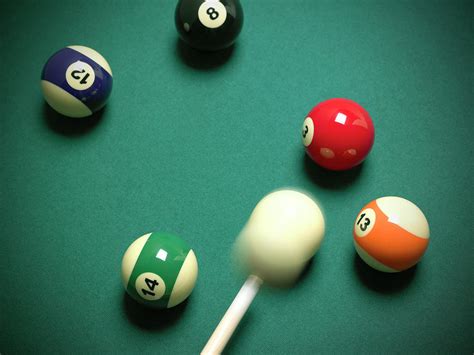
We know how playing pool works.
Ball A hits Ball B.
Ball A makes Ball B move.
So far so good. We say that Ball A “causes” Ball B to move. This seems obvious to us. End of discussion.
But Hume says, not so fast. He doesn’t like the word “causes” as it’s used here. He believes it’s sloppy thinking.
the problem of causation
So what’s Hume’s problem? Anybody can see that Ball A hits Ball B and then Ball B gets sent flying. It should be clear that Ball A is the cause of Ball B’s movement. But Hume interrupts, “We need to talk about this.”
Hume says that, yes, we can see that Ball A hits Ball B. No dispute on that. And Hume agrees that, after the collision, Ball B moves and shoots away. His issue, though, has to do with the word “causes.” This is Hume’s sticking point. He says that, in all that we’ve seen on the pool table, we didn’t actually see anything that looked like “necessary causal connection.” We saw something else.
Our response might be – my response for a long time was – “Wait a minute, what do you mean we don’t see causation; what did we see if we didn’t see causation when A hit B?”
Hume answers with, “What we saw was two events, contiguous in time, operating sequentially; what we saw was one event closely following another event. But we did not see a necessary causal connection.”
We’re not happy with Hume’s objection. It feels like nit-picking to us. We insist that we’re looking at causation. But Hume doesn’t give up, and, if we hear him out, we'll discover that he’s making a very important point.
We need to carefully consider the term “necessary causal connection.” The word “necessary” means that any time two billiard balls hit each other in the same way, we are guaranteed to get the same result. But we can’t guarantee that result.
Yes, granted, all of our lives we’ve known about billiard balls, and we’ve seen them operate in a predictable way – but, to say that all billiard balls, for all time, anywhere on planet Earth, or somewhere in the universe, will act the same as they do today, is an untenable statement. To make a statement like that, we would have to make certain that the laws of physics operate, and will operate, the same as they do today, in all other venues. We have no ability to know such things.
Editor’s note: In lines 11-14, Hume creates a thought experiment. What would have happened if the mythical Adam had been shown a pool table by God? As Adam was totally lacking in experience, he would not have assumed any particular outcome at the prospect of one ball hitting another. By this example of Adam, Hume suggests that what we deem to be causation, in terms of how we believe the balls should act, is nothing more than our experience extended, a habit of mind on our part. This is what we’ve known, and so this is what we’ve come to expect; and, so often, this conditioned expectation is the basis for our confident beliefs (line 22, 27) in causation. This is why members of religion, or political parties, or scientific camps can be so self-assured: it's limited experience and limited knowledge linked to a habit of mind, a conditioned mind, a "reality tunnel" as some philosophers call it, to see the world in a certain narrowed way, and the resultant sense of faux-certainty and cheap confidence can be quite intoxicating.
Let’s look at another example, and then come back to the pool table. Often on the Word Gems site I’ve employed the example of the rooster crowing at dawn, believing that its crying makes the Sun to rise.
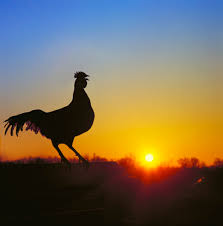
The rooster is totally convinced - in fact, has developed an unshakeable belief-system, even a strict religion, around a certainty that its sunrise chorus is efficacious in causing the dawn to appear: “I mean, what could be more obvious,” the chanticleer intones. “I sing early each morning, and then, whadya know, the Sun pops up over that eastern horizon. It's like clockwork. It’s never failed; for thousands of years, it’s never failed. I rest my case. My singing causes the Sun to rise.”
Well, we could approach this issue from a few angles. One would be to point out that the Sun doesn’t really rise at all, but the Earth spins. However, let’s not get into that and instead humor the rooster and his beliefs: “Ok then, each morning you sing and the Sun rises – and maybe this gig has had a long run, but can you guarantee that it will continue? Are you certain there’s a 'necessary causal connection' between your singing and the rising?” (line 21) We would be impolite to point out to our cocky friend that at some point in the future our Sun will go super-nova and, in the firestorm, burn to cinder the Earth and other planets. "When that happens, what will your singing produce on that morning? – if there is a morning.”
The words “necessary causal connection” speak to absolute knowledge. We don’t have it. And we’re not going to get it. And so, when Hume demurs over our comment concerning “causation” about the pool table, we need to consider the following overarching principle. We do not possess...
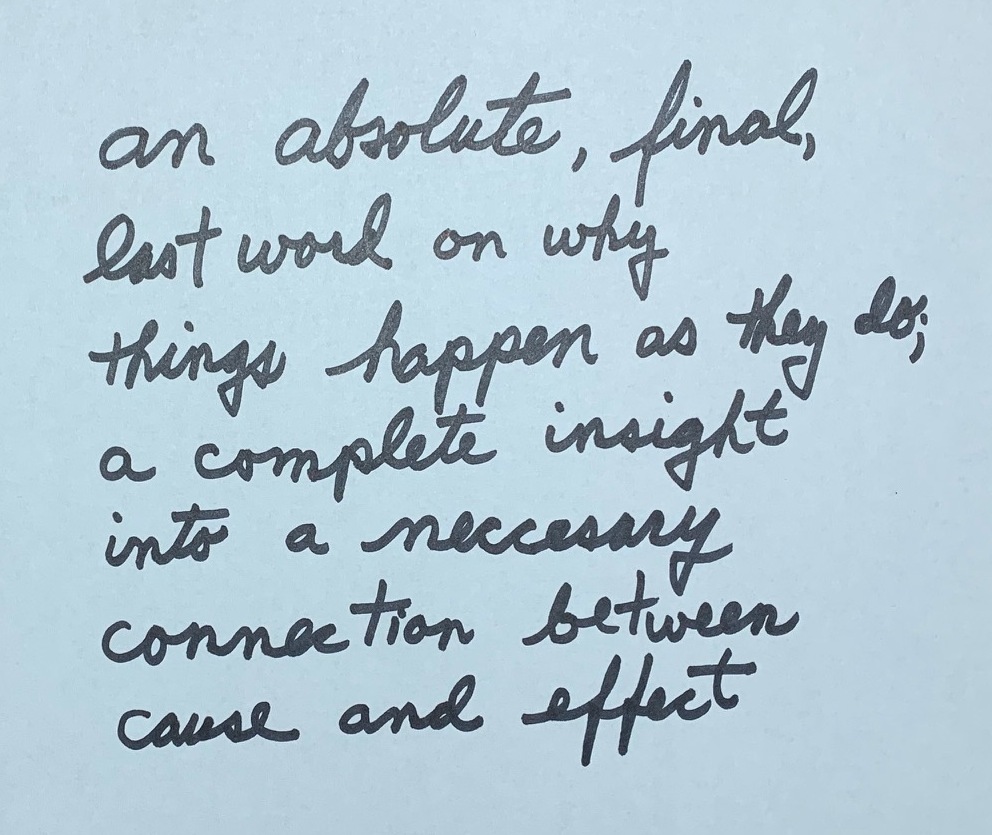
This is what we do not have; and our level of knowledge will remain incomplete this way for a very long time to come.
And so, if we didn’t see “causation” on the pool table, what did we see?
Hume says, what we saw was “constant conjunction.”
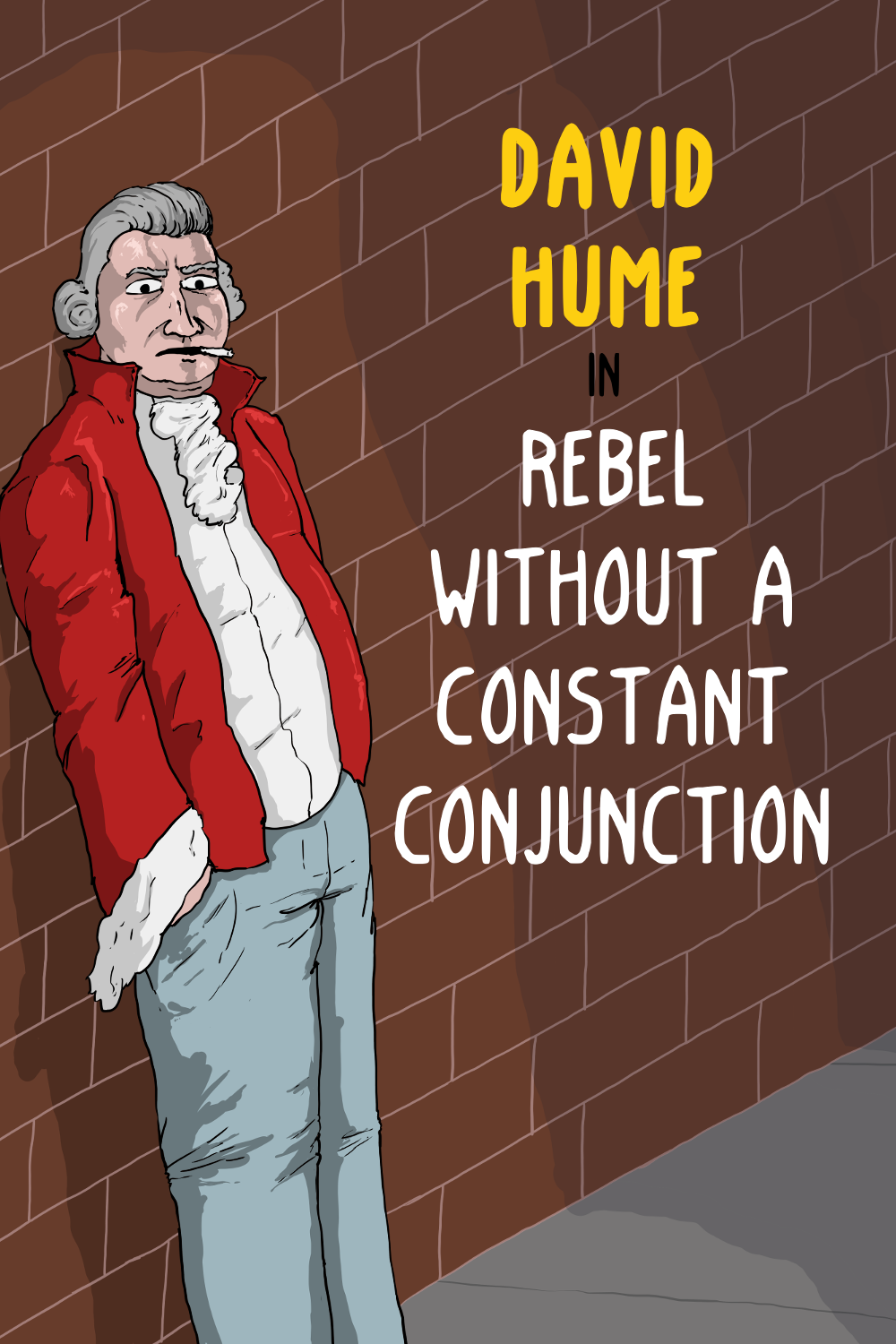
We made a judgment concerning how Ball A would affect Ball B. It was inference based upon a system of regularities we’ve known all of our lives concerning billiard balls.
Inferences such as these work just fine within the limited scope of what we usually need to do on planet Earth. “Constant conjunction” can offer a good probability on what will happen next time. A problem for us occurs, however, when we step over the line into claiming for ourselves unsupportable belief-systems which presuppose an absolute knowledge.
the problem of induction
Hume also had some good things to say about induction. We covered this topic in the article “What Scientists Know and How They Know It” by Dr. Steven Goldman.
“Induction” is fact-collecting (think of in-gathering of facts). We collect information and then form hypotheses and theories. This is all well and good, but the problem arises when we can’t gather enough information to make a generalized universal rule.
Let’s consider our friend the rooster again. He believes that the Sun will rise every morning. Why does he believe this? He believes it because he’s been gathering information on this all of his rooster-life, and every morning the Sun has obediently risen. His conclusion is based on inductive reasoning (line 21).
But philosophy students will point out the error of thinking here. Induction is not a proper form of reasoning in this case because it presupposes what it’s trying to prove. The rooster’s evidence is about the past, and there’s no necessary connection between the past and the future. All the rooster has is "constant conjunction" (line 9).
And it’s not that the rooster doesn’t have much evidence, he doesn’t have any certain evidence. Why? We cannot be sure that the future will look like the past.
Editors’ note: To clarify: The rooster’s logic represents circular reasoning because, let’s say, he’s sung his song for 1000 mornings. All these, each one in its turn, become, for him, points of evidence indicating that the future, each day as it comes to him, resembles the past. The rooster would now like to inductively string these successes along into a big-splash universal law, “the Sun will rise every morning.” But here’s where he goes off the rails of logic. His premise is, “the future, each day, as it comes to me, so far, resembles the past,” but his would-be generalized “law” is “the future will resemble the past.” In other words, x = x. You can’t use your major premise to prove the same thing in the conclusion. This is circular reasoning. And every science, religion, or political party that attempts to pontificate on universals falls into the same error. Little wonder then, especially on the religion side, but also with the others, we have thousands of competing and conflicting "one, true doctrines" and "universal laws."
|
Editor's note:
The great physicist David Bohm pointed out that the Greek word for “theory” has a root that means “view” or “spectator.” This gave rise to a related Greek word for “theater.” A theory needs to be fleshed out with reasonable conjecture, a certain artistic license is called for when facts are few to come by; “theatrics,” if you will. However, in the showmanship, rules of evidence must be observed - or scientific theater quickly devolves to cultish circus.
|
Does all this remind you of anything?
To restate: the “laws” of science and the “laws” of religion” are based upon this kind of faulty circular reasoning. Dr. Goldman points this out. All of these "laws" are unsubstantiated, as ever they shall be, for to achieve certitude here would require a universal knowledge, which, in most cases for frail mortals, is somewhat lacking. The best we can hope for, via the five senses, is “constant conjunction,” which might offer a measure of probabilistic assurance of systemization and regularity, for day-to-day purposes.
The classic example of error here is codified in the saying, “All swans are white” – once believed to be a universal truism. But then, inconveniently, black swans were discovered in Western Australia. It takes only one anomaly to overturn the applecart of a well-crafted cultism.
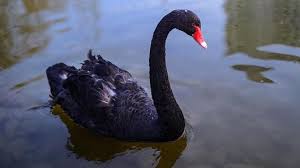


|
Editor's last word:
All of this offers reason why Dr. Sheldrake prefers the term "habits of nature" rather than the anthropomorphic "laws." I might even choose "currently-manifesting regularities" as the entire cosmos seems to be evolving.
Also, see the article on "Certainty" for more discussion. Eventually, it will be discerned that, to move forward with knowledge acquisition, the scientist will need to become a mystic. The highest levels of knowledge cannot be obtained via the scientific method.
As a summary of the problem of causation, we're like Pavlov's dogs, believing that a tinkling bell necessarily equals dinner. Not really, and not every time. The dogs' belief was just a conditioning of the brain. This gives new meaning to "dogmatic slumber."

|
|












